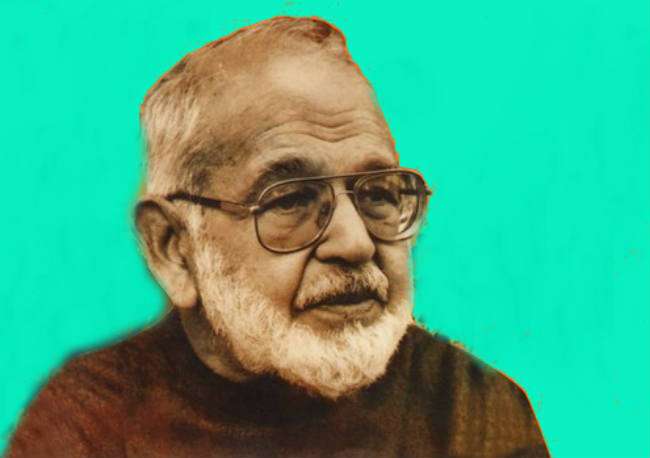Sachchidananda Hirananda Vatsyayan (7 March 1911 – 4 April 1987), popularly known by his nom de plume Agyeya (lit. Unknowable), was an Indian writer, poet, novelist, literary critic, journalist, translator and revolutionary in Hindi language. He is regarded as the pioneer of the Nayi Kavita (New Poetry) and Prayogavaad (Experimentalism) movements in modern Hindi literature. He also edited the Saptaks, a poetry series, and started the Hindi newsweekly Dinaman. Agyeya translated some of his own works, as well as works of some other Indian authors to English. He also translated some books of world literature into Hindi. Agyeya was born as Sachchidananda Vatsyayan in Punjabi Brahmin family on 7 March 1911 in an archaeological camp near Kasia, Kushinagar district of Uttar Pradesh, where his father, Hiranand Sastri, an archaeologist, was positioned for an excavation. His mother was Vyantidevi (d. 1924) who was not much educated. Hiranand Sastri and Vyantidevi had 10 children, of whom Agyeya was the fourth. Agyeya spent his early childhood in Lucknow (1911–1915). Due to his father's professional appointment at various places, he had to shift to various places including Srinagar and Jammu (1915–1919), Patna (1920), Nalanda (1921) and the Ootacamund and Kotagiri (1921–1925). Due to this peripatetic lifestyle, Agyeya came into contact with different Indian languages and cultures. His father, himself a scholar of Sanskrit, encouraged him to study Hindi and taught him some basic English. He was taught Sanskrit and Persian by Pandit and Maulavi in Jammu. Forman Christian College in 1930; where Agyeya studied B.Sc After passing his matriculation in 1925 from the University of Punjab, Agyeya moved to Madras, joined the Madras Christian College, and did Intermediate in Science in 1927, studying mathematics, physics and chemistry. In the same year, he joined the Forman Christian College in Lahore, where he studied mathematics, physics, chemistry and English, and received a Bachelor of Science in 1929, standing first in a class. Thereafter he enrolled for an MA in English, but dropped out, and joined the Hindustan Socialist Republican Army (HSRA), a revolutionary organisation, with a view to fight for Indian independence movement, and participated in rebellious activities against the British colonial government. In November 1930, he was arrested on account of his involvement in the attempt to help Bhagat Singh, a socialist revolutionary and leader of HSRA, to escape from jail in 1929. He was then sentenced on charge of sedition against British rule in India. He spent the next four years in jail in Lahore, Delhi and Amritsar. During these prison days, he started writing short stories, poems and the first draft of his novel Shekhar: Ek Jivani. He was associated with the Progressive Writers Association (PWA) and, in 1942, he organised the All India Anti-Fascist Convention. During World War II in 1942, he joined the Indian army and was sent to the Kohima Front as a combatant officer. He left the army in 1946. He stayed at Meerut (Uttar Pradesh) for sometime and remained active in local literary groups. During this period, he published several translations into English of other writers, and a collection of his own poems, Prison Days and Other Poems. Agyeya married Santosh Malik in 1940, and divorced her in 1945. He married Kapila Vatsyayan (née Malik) on 7 July 1956. They separated in 1969. He died on 4 April 1987, aged 76, in New Delhi. He was cremated at Nigambodh Ghat.
NaN
